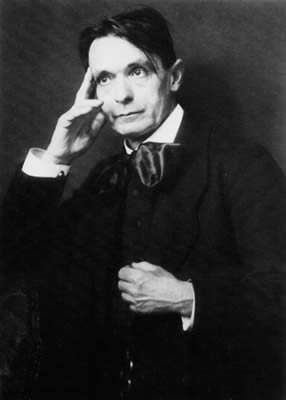 |
| Rudolf Steiner |
Rudolf Steiner: "Some people are destined by karma to announce prophetically what all of humanity will gradually, bit by bit, accept as the meaning of an epoch."
Rudolf Steiner: "Whoever does not believe in all humility that his wisdom is the sum of all wisdom – that his judgement represents the highest judgment – will soon be able to observe that there are people apart from himself who have more wisdom and judgment [than himself], and he will listen to these beings and allow himself to be instructed by them. He will, when he gains some insight, become aware that he still has a path to follow that others have gone long before him. The more understanding a person obtains, the humbler he becomes. The clearer the realization how much he still has to learn, the more he will be inclined to find those he can still learn from. Anyone who thinks that he has nothing to learn from others only proves thereby that he or she has still not advanced very far. The more advanced a person is, the more he comes to recognize that human beings are on different levels of development and that there have always been those who were more advanced than their brethren – the spiritual leaders of humanity who are more advanced in their development, the highly developed, the most advanced individualities of humankind."
This is what reading Rudolf Steiner is like
The Gospel of Thomas, Saying 8:

Here's a thought experiment: If you could send a message to your 12-year-old self, and you were limited to 2 words, what would your message be?
For me the answer's easy: "Rudolf Steiner"

Steiner! Steiner! and more Steiner! always more Steiner!
Rudolf Steiner: "We can be tempted and seduced by the most beautiful things if we pursue them one-sidedly, and this one-sidedness, if it takes hold, can also turn every good endeavor and striving into fanaticism. It is true that humanity advances through its noble impulses, but it is also true that the impassioned and fanatic advocacy of the noblest impulses can bring about the worst results for our development. Only when we strive toward the highest goals with humility and clarity, and not out of impassioned enthusiasm, will wholesome and healthy developments for the progress of humanity result."
The name of him whom Providence has chosen
That wondrous things on Earth he should achieve,
Whom I may often praise, though ne'er sufficing,
Whose destiny we scarcely can believe,
His name — it is Humanus, Saint and wise one,
The best of men whom I did e'er perceive:
--from "The Mysteries" by Goethe





No comments:
Post a Comment